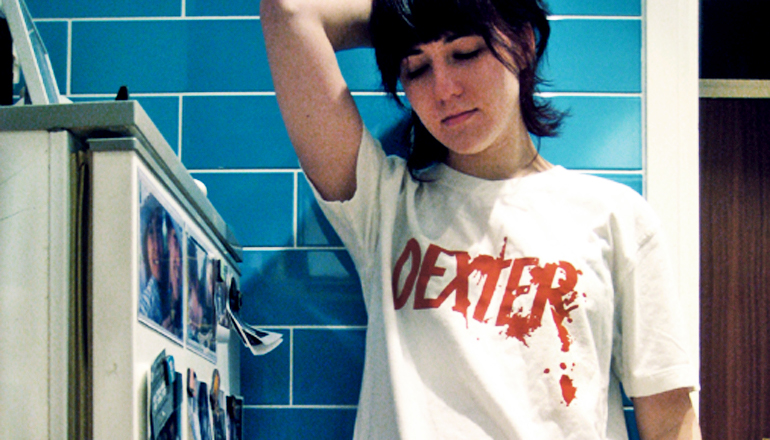"TV shows, movies, and books are full of characters we root for despite their despicable acts. Consider Dexter, the honorable serial killer, Walter White, the meth-cooking family man, and Arya Stark, the young assassin who seeks to avenge her slain family.
To make sense of viewers’ engagement with shows and stories featuring morally complex characters, Mina Tsay-Vogel, an assistant professor of communication at Boston University’s College of Communication, is looking beyond the past research that suggests viewers get the most enjoyment from watching good characters win and bad characters lose.
This argument is too simplistic for studying narratives that are constructed to encourage viewers or readers to empathize with morally complex characters, she says. For example, Dexter (from Showtime’s hit show by the same name) is a serial killer, but there’s a compelling reason for his depravity, says Tsay-Vogel, also the co-director of the Communication Research Center.
“You learn about his childhood and you start empathizing” with him—as a child he witnessed his mother’s murder; as an adult, he helps stop (and take out) other killers. Characters like Dexter complicate our concept of good, “so, you’re not always rooting for good and hoping that agony and suffering happens” to characters who do bad things.
- MOTIVATIONS MATTER:
In a 2013 study published in the journal Mass Communication and Society, Tsay-Vogel and K. Maja Krakowiak, an associate professor of communication at the University of Colorado, Colorado Springs, tested how character motivation and a story’s outcome influence how we feel about characters.
They asked two groups of study participants ages 19 to 30 to read different versions of a story in which the protagonist commits an action (which Tsay-Vogel is keeping secret as it is also featured in an ongoing study) that seems negative: In one version, his motivation is selfish, while in the other, it is altruistic.
Tsay-Vogel and Krakowiak learned that when a character commits a negative action but is motivated by altruism, we are more likely to see that character in a positive light. In the AMC show Breaking Bad, for example, chemistry teacher Walter White begins to cook meth—but the fact that he has been diagnosed with cancer and is motivated by the desire to ensure that his family is provided for after his death makes him an empathetic character.
The researchers also found that people tend to see a character in a more positive light if the story outcome is positive, even if the character’s action is selfishly motivated. In the Harry Potter series, for example, wizard Severus Snape envied the eponymous hero’s father, which indirectly led to the parents’ murder by Lord Voldemort—but Snape ultimately helped defeat Voldemort, for which most Potter fans (and even Harry Potter) considered him a hero.
- ‘AT LEAST I’M NOT AS BAD AS DEXTER’:
When justifying a character’s actions in this way, we are committing moral disengagement, a condition Tsay-Vogel and Krakowiak explored in a study published in the journal Human Communication Research in 2015.
This study tested how our feelings about ourselves play into our responses to morally complex characters. They asked one group of participants to write a series of actions they were proud of, and a second group to write a series of behaviors of which they were ashamed. Those who were primed to feel bad about themselves before reading about a morally ambiguous character enjoyed the story more than those who felt good about themselves.
So, “if you had a really bad day and did something you weren’t proud of, you could go home and turn on a show that features moral ambiguity and bad characters—and feel significantly better about yourself,” Tsay-Vogel says. A viewer could watch Dexter, for example, and think, “At least I’m not as bad as Dexter.”
“Morally ambiguous characters,” she says, “can actually make people feel better about their own actions in the real world. We call this term morality salience, which is making people aware of their own moral actions” and how our standards influence our engagement with morally complex characters.
When we watch a character commit a negative action and we excuse or justify their behavior, we are loosening our moral standards for the sake of enjoying the story, Tsay-Vogel says. We don’t all morally disengage to the same degree, however, and some of us don’t morally disengage at all.
Tsay-Vogel has found that our ability to justify a character’s actions is driven largely by the degree to which we identify with that character, as well as how much we think we are similar to that character. Viewers who see the world and a character’s motivations through the lens of that character are more likely to morally disengage and enjoy the viewing experience.
DO VIEWERS WANT FUN OR MEANING?
Our reasons for spending a few hours watching a show play a part, too—are we kicking back and having fun or trying to get our gray matter whirring? In a 2016 study published in the journal Communication Research Reports, Tsay-Vogel and Krakowiak report that audiences who primarily seek pleasure from entertainment are more likely to morally disengage or justify characters’ immoral behaviors, which allows them to feel greater enjoyment.
Those who are more focused on seeking meaning from entertainment are less tolerant of characters’ negative actions (possibly because these viewers have stricter moral standards), so they experience less enjoyment.
For content creators, there’s a valuable lesson here: “If you show characters doing a morally ambiguous action, but you don’t focus on the altruism behind it, or if the outcome is negative, you are not going to get people to like the characters or enjoy what they are seeing because they can’t justify the characters’ actions,” Tsay-Vogel says.
To keep viewers interested, she suggests “focusing on character motivations and ensuring the story outcome is very clear; so even if there are ambiguous actions, they still produce relatively positive outcomes.”
Fuente: www.futurity.org
